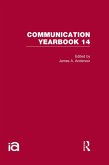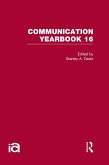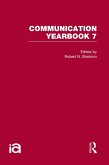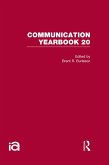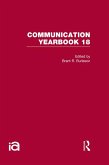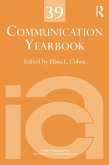Communication Yearbook 12 (eBook, ePUB)
Redaktion: Anderson, James A.
46,95 €
46,95 €
inkl. MwSt.
Sofort per Download lieferbar

23 °P sammeln
46,95 €
Als Download kaufen

46,95 €
inkl. MwSt.
Sofort per Download lieferbar

23 °P sammeln
Jetzt verschenken
Alle Infos zum eBook verschenken
46,95 €
inkl. MwSt.
Sofort per Download lieferbar
Alle Infos zum eBook verschenken

23 °P sammeln
Communication Yearbook 12 (eBook, ePUB)
Redaktion: Anderson, James A.
- Format: ePub
- Merkliste
- Auf die Merkliste
- Bewerten Bewerten
- Teilen
- Produkt teilen
- Produkterinnerung
- Produkterinnerung

Bitte loggen Sie sich zunächst in Ihr Kundenkonto ein oder registrieren Sie sich bei
bücher.de, um das eBook-Abo tolino select nutzen zu können.
Hier können Sie sich einloggen
Hier können Sie sich einloggen
Sie sind bereits eingeloggt. Klicken Sie auf 2. tolino select Abo, um fortzufahren.

Bitte loggen Sie sich zunächst in Ihr Kundenkonto ein oder registrieren Sie sich bei bücher.de, um das eBook-Abo tolino select nutzen zu können.
In Communication Yearbook 11 major contributions from leading scholars in a variety of communication fields are presented and then critiqued by other authorities (often representing complementary or competing schools of thought). Topics addressed and commented on include the mass media audience, the theory of mediation, effective policy for health care communication and feminist criticism of television.
- Geräte: eReader
- mit Kopierschutz
- eBook Hilfe
- Größe: 3.51MB
Andere Kunden interessierten sich auch für
![Communication Yearbook 14 (eBook, ePUB) Communication Yearbook 14 (eBook, ePUB)]() Communication Yearbook 14 (eBook, ePUB)46,95 €
Communication Yearbook 14 (eBook, ePUB)46,95 €![Communication Yearbook 16 (eBook, ePUB) Communication Yearbook 16 (eBook, ePUB)]() Communication Yearbook 16 (eBook, ePUB)48,95 €
Communication Yearbook 16 (eBook, ePUB)48,95 €![Communication Yearbook 7 (eBook, ePUB) Communication Yearbook 7 (eBook, ePUB)]() Communication Yearbook 7 (eBook, ePUB)46,95 €
Communication Yearbook 7 (eBook, ePUB)46,95 €![Communication Yearbook 20 (eBook, ePUB) Communication Yearbook 20 (eBook, ePUB)]() Communication Yearbook 20 (eBook, ePUB)48,95 €
Communication Yearbook 20 (eBook, ePUB)48,95 €![Communication Yearbook 10 (eBook, ePUB) Communication Yearbook 10 (eBook, ePUB)]() Communication Yearbook 10 (eBook, ePUB)47,95 €
Communication Yearbook 10 (eBook, ePUB)47,95 €![Communication Yearbook 18 (eBook, ePUB) Communication Yearbook 18 (eBook, ePUB)]() Communication Yearbook 18 (eBook, ePUB)45,95 €
Communication Yearbook 18 (eBook, ePUB)45,95 €![Communication Yearbook 39 (eBook, ePUB) Communication Yearbook 39 (eBook, ePUB)]() Communication Yearbook 39 (eBook, ePUB)31,95 €
Communication Yearbook 39 (eBook, ePUB)31,95 €-
-
-
In Communication Yearbook 11 major contributions from leading scholars in a variety of communication fields are presented and then critiqued by other authorities (often representing complementary or competing schools of thought). Topics addressed and commented on include the mass media audience, the theory of mediation, effective policy for health care communication and feminist criticism of television.
Dieser Download kann aus rechtlichen Gründen nur mit Rechnungsadresse in A, B, BG, CY, CZ, D, DK, EW, E, FIN, F, GR, HR, H, IRL, I, LT, L, LR, M, NL, PL, P, R, S, SLO, SK ausgeliefert werden.
Produktdetails
- Produktdetails
- Verlag: Taylor & Francis eBooks
- Seitenzahl: 712
- Erscheinungstermin: 22. März 2012
- Englisch
- ISBN-13: 9781135152369
- Artikelnr.: 38261359
- Verlag: Taylor & Francis eBooks
- Seitenzahl: 712
- Erscheinungstermin: 22. März 2012
- Englisch
- ISBN-13: 9781135152369
- Artikelnr.: 38261359
- Herstellerkennzeichnung Die Herstellerinformationen sind derzeit nicht verfügbar.
James A. Anderson
Section 1: Discourse and Relationships 1. Structures of Discourse and
Structures of Power Teun A. Van Dijk Commentaries: Power, Discourse, and
Ideology: The Micropractices of Common Sense Leonard C. Hawes The
Irrationality of Power Ruth Wodak 2. Coherence: A Meaningful Adhesive for
Discourse Kathy Kellermann and Carra Sleight Commentaries: On Coherence
Judgements and Their Multiple Causes: A View from the Message-Variable
Paradigm James J. Bradac About Coherence Sally Jackson and Scott Jacobs 3.
A Dialectical Analysis of the Tensions, Functions and Strategic Challenges
of Communication in Young Adult Friendships William K. Rawlins
Commentaries: Further Dialectics: Strangers, Friends, and Historical
Transformations David R. Maines What is Friendship? A Hermeneutical Quibble
Allen Scult 4. Second-Guessing Theory: Review and Extension Dean E. Hewes
and Maudie L. Graham Commentaries: On Second-Guessing the Theory of
Second-Guessing: A Comment Michael E. Roloff Second-Guessing
Second-Guessing: Yet Another Comment Gerald R. Miller Section 2:
Intercultural Relationships and Cultural Identity 5. Intercultural
Communication Revisited: Conceptualisation, Paradigm Building, and
Methodological Approaches Fred L. Casmir and Nobleza C. Asuncion-Lande
Commentary: Ceterius Paribus in the Global Village: A Research Agenda for
Intercultural Communication Theory Building William J. Starosta 6. Culture
and the Development of Interpersonal Relationships William B. Gudykunst
Commentaries: Uncertainty in Interpersonal Relationships: A Predicted
Outcome Value Interpretation of Gudykunst's Research Program Michael
Sunnafrank Culture and Interpersonal Relationship Development: Some
Conceptual Issues Stella Ting-Toomey 7. Cultural Identity and Modes of
Communication Jan Servaes Commentaries: The Relationship Between Cultural
Identity and Modes of Communication Cees J. Hamelink Poststructuralist
Concepts in Culture and Communication Syed A. Rahim Section 3: Technology
and Communication Systems 8. Issues and Concepts in Research on
Computer-Mediated Communication Systems Ronald E. Rice Commentaries:
Classifying Mediated Communication Systems Carrie Heeter Commentary on
Issues and Concepts in Research on Computer-Mediated Communication Systems
Jerome Johnston 9. Designing Communication Systems for Human Systems:
Values and Assumptions of "Socially Open Architecture" Stephen R. Acker
Commentaries: Interactions Communication Systems, Values, and the
Requirement of Self-Reflection Eric S. Fredin Toward an Open Architecture
and User-Centered Approach to Media Design Diana Gagnon Section 4: Media
Cultural Studies 10. The Return of the "Critical" and the Challenge of
Radical Dissent: Critical Theory, Cultural Studies, and American Mass
Communication Research Hanno Hardt Commentaries: Cultural Studies: From Old
World to New World Farrell Corcoran Critical Theory and Empirical Critique
in Mass Communication Research: Some Methodological Considerations Slavko
Splichal Section 5: Organizations and Gifts 11. One-Way Communication
Transfers in Loosely Coupled Systems Larry Davis Bronwing and Sheila C.
Henderson Commentaries: Social Indicators of One-Way Transfers in
Organizations Kenneth E. Boulding One-Way Transfers and Organizational
Cohesion Karl E. Weick and J. Douglas Orton
Structures of Power Teun A. Van Dijk Commentaries: Power, Discourse, and
Ideology: The Micropractices of Common Sense Leonard C. Hawes The
Irrationality of Power Ruth Wodak 2. Coherence: A Meaningful Adhesive for
Discourse Kathy Kellermann and Carra Sleight Commentaries: On Coherence
Judgements and Their Multiple Causes: A View from the Message-Variable
Paradigm James J. Bradac About Coherence Sally Jackson and Scott Jacobs 3.
A Dialectical Analysis of the Tensions, Functions and Strategic Challenges
of Communication in Young Adult Friendships William K. Rawlins
Commentaries: Further Dialectics: Strangers, Friends, and Historical
Transformations David R. Maines What is Friendship? A Hermeneutical Quibble
Allen Scult 4. Second-Guessing Theory: Review and Extension Dean E. Hewes
and Maudie L. Graham Commentaries: On Second-Guessing the Theory of
Second-Guessing: A Comment Michael E. Roloff Second-Guessing
Second-Guessing: Yet Another Comment Gerald R. Miller Section 2:
Intercultural Relationships and Cultural Identity 5. Intercultural
Communication Revisited: Conceptualisation, Paradigm Building, and
Methodological Approaches Fred L. Casmir and Nobleza C. Asuncion-Lande
Commentary: Ceterius Paribus in the Global Village: A Research Agenda for
Intercultural Communication Theory Building William J. Starosta 6. Culture
and the Development of Interpersonal Relationships William B. Gudykunst
Commentaries: Uncertainty in Interpersonal Relationships: A Predicted
Outcome Value Interpretation of Gudykunst's Research Program Michael
Sunnafrank Culture and Interpersonal Relationship Development: Some
Conceptual Issues Stella Ting-Toomey 7. Cultural Identity and Modes of
Communication Jan Servaes Commentaries: The Relationship Between Cultural
Identity and Modes of Communication Cees J. Hamelink Poststructuralist
Concepts in Culture and Communication Syed A. Rahim Section 3: Technology
and Communication Systems 8. Issues and Concepts in Research on
Computer-Mediated Communication Systems Ronald E. Rice Commentaries:
Classifying Mediated Communication Systems Carrie Heeter Commentary on
Issues and Concepts in Research on Computer-Mediated Communication Systems
Jerome Johnston 9. Designing Communication Systems for Human Systems:
Values and Assumptions of "Socially Open Architecture" Stephen R. Acker
Commentaries: Interactions Communication Systems, Values, and the
Requirement of Self-Reflection Eric S. Fredin Toward an Open Architecture
and User-Centered Approach to Media Design Diana Gagnon Section 4: Media
Cultural Studies 10. The Return of the "Critical" and the Challenge of
Radical Dissent: Critical Theory, Cultural Studies, and American Mass
Communication Research Hanno Hardt Commentaries: Cultural Studies: From Old
World to New World Farrell Corcoran Critical Theory and Empirical Critique
in Mass Communication Research: Some Methodological Considerations Slavko
Splichal Section 5: Organizations and Gifts 11. One-Way Communication
Transfers in Loosely Coupled Systems Larry Davis Bronwing and Sheila C.
Henderson Commentaries: Social Indicators of One-Way Transfers in
Organizations Kenneth E. Boulding One-Way Transfers and Organizational
Cohesion Karl E. Weick and J. Douglas Orton
Section 1: Discourse and Relationships 1. Structures of Discourse and
Structures of Power Teun A. Van Dijk Commentaries: Power, Discourse, and
Ideology: The Micropractices of Common Sense Leonard C. Hawes The
Irrationality of Power Ruth Wodak 2. Coherence: A Meaningful Adhesive for
Discourse Kathy Kellermann and Carra Sleight Commentaries: On Coherence
Judgements and Their Multiple Causes: A View from the Message-Variable
Paradigm James J. Bradac About Coherence Sally Jackson and Scott Jacobs 3.
A Dialectical Analysis of the Tensions, Functions and Strategic Challenges
of Communication in Young Adult Friendships William K. Rawlins
Commentaries: Further Dialectics: Strangers, Friends, and Historical
Transformations David R. Maines What is Friendship? A Hermeneutical Quibble
Allen Scult 4. Second-Guessing Theory: Review and Extension Dean E. Hewes
and Maudie L. Graham Commentaries: On Second-Guessing the Theory of
Second-Guessing: A Comment Michael E. Roloff Second-Guessing
Second-Guessing: Yet Another Comment Gerald R. Miller Section 2:
Intercultural Relationships and Cultural Identity 5. Intercultural
Communication Revisited: Conceptualisation, Paradigm Building, and
Methodological Approaches Fred L. Casmir and Nobleza C. Asuncion-Lande
Commentary: Ceterius Paribus in the Global Village: A Research Agenda for
Intercultural Communication Theory Building William J. Starosta 6. Culture
and the Development of Interpersonal Relationships William B. Gudykunst
Commentaries: Uncertainty in Interpersonal Relationships: A Predicted
Outcome Value Interpretation of Gudykunst's Research Program Michael
Sunnafrank Culture and Interpersonal Relationship Development: Some
Conceptual Issues Stella Ting-Toomey 7. Cultural Identity and Modes of
Communication Jan Servaes Commentaries: The Relationship Between Cultural
Identity and Modes of Communication Cees J. Hamelink Poststructuralist
Concepts in Culture and Communication Syed A. Rahim Section 3: Technology
and Communication Systems 8. Issues and Concepts in Research on
Computer-Mediated Communication Systems Ronald E. Rice Commentaries:
Classifying Mediated Communication Systems Carrie Heeter Commentary on
Issues and Concepts in Research on Computer-Mediated Communication Systems
Jerome Johnston 9. Designing Communication Systems for Human Systems:
Values and Assumptions of "Socially Open Architecture" Stephen R. Acker
Commentaries: Interactions Communication Systems, Values, and the
Requirement of Self-Reflection Eric S. Fredin Toward an Open Architecture
and User-Centered Approach to Media Design Diana Gagnon Section 4: Media
Cultural Studies 10. The Return of the "Critical" and the Challenge of
Radical Dissent: Critical Theory, Cultural Studies, and American Mass
Communication Research Hanno Hardt Commentaries: Cultural Studies: From Old
World to New World Farrell Corcoran Critical Theory and Empirical Critique
in Mass Communication Research: Some Methodological Considerations Slavko
Splichal Section 5: Organizations and Gifts 11. One-Way Communication
Transfers in Loosely Coupled Systems Larry Davis Bronwing and Sheila C.
Henderson Commentaries: Social Indicators of One-Way Transfers in
Organizations Kenneth E. Boulding One-Way Transfers and Organizational
Cohesion Karl E. Weick and J. Douglas Orton
Structures of Power Teun A. Van Dijk Commentaries: Power, Discourse, and
Ideology: The Micropractices of Common Sense Leonard C. Hawes The
Irrationality of Power Ruth Wodak 2. Coherence: A Meaningful Adhesive for
Discourse Kathy Kellermann and Carra Sleight Commentaries: On Coherence
Judgements and Their Multiple Causes: A View from the Message-Variable
Paradigm James J. Bradac About Coherence Sally Jackson and Scott Jacobs 3.
A Dialectical Analysis of the Tensions, Functions and Strategic Challenges
of Communication in Young Adult Friendships William K. Rawlins
Commentaries: Further Dialectics: Strangers, Friends, and Historical
Transformations David R. Maines What is Friendship? A Hermeneutical Quibble
Allen Scult 4. Second-Guessing Theory: Review and Extension Dean E. Hewes
and Maudie L. Graham Commentaries: On Second-Guessing the Theory of
Second-Guessing: A Comment Michael E. Roloff Second-Guessing
Second-Guessing: Yet Another Comment Gerald R. Miller Section 2:
Intercultural Relationships and Cultural Identity 5. Intercultural
Communication Revisited: Conceptualisation, Paradigm Building, and
Methodological Approaches Fred L. Casmir and Nobleza C. Asuncion-Lande
Commentary: Ceterius Paribus in the Global Village: A Research Agenda for
Intercultural Communication Theory Building William J. Starosta 6. Culture
and the Development of Interpersonal Relationships William B. Gudykunst
Commentaries: Uncertainty in Interpersonal Relationships: A Predicted
Outcome Value Interpretation of Gudykunst's Research Program Michael
Sunnafrank Culture and Interpersonal Relationship Development: Some
Conceptual Issues Stella Ting-Toomey 7. Cultural Identity and Modes of
Communication Jan Servaes Commentaries: The Relationship Between Cultural
Identity and Modes of Communication Cees J. Hamelink Poststructuralist
Concepts in Culture and Communication Syed A. Rahim Section 3: Technology
and Communication Systems 8. Issues and Concepts in Research on
Computer-Mediated Communication Systems Ronald E. Rice Commentaries:
Classifying Mediated Communication Systems Carrie Heeter Commentary on
Issues and Concepts in Research on Computer-Mediated Communication Systems
Jerome Johnston 9. Designing Communication Systems for Human Systems:
Values and Assumptions of "Socially Open Architecture" Stephen R. Acker
Commentaries: Interactions Communication Systems, Values, and the
Requirement of Self-Reflection Eric S. Fredin Toward an Open Architecture
and User-Centered Approach to Media Design Diana Gagnon Section 4: Media
Cultural Studies 10. The Return of the "Critical" and the Challenge of
Radical Dissent: Critical Theory, Cultural Studies, and American Mass
Communication Research Hanno Hardt Commentaries: Cultural Studies: From Old
World to New World Farrell Corcoran Critical Theory and Empirical Critique
in Mass Communication Research: Some Methodological Considerations Slavko
Splichal Section 5: Organizations and Gifts 11. One-Way Communication
Transfers in Loosely Coupled Systems Larry Davis Bronwing and Sheila C.
Henderson Commentaries: Social Indicators of One-Way Transfers in
Organizations Kenneth E. Boulding One-Way Transfers and Organizational
Cohesion Karl E. Weick and J. Douglas Orton

